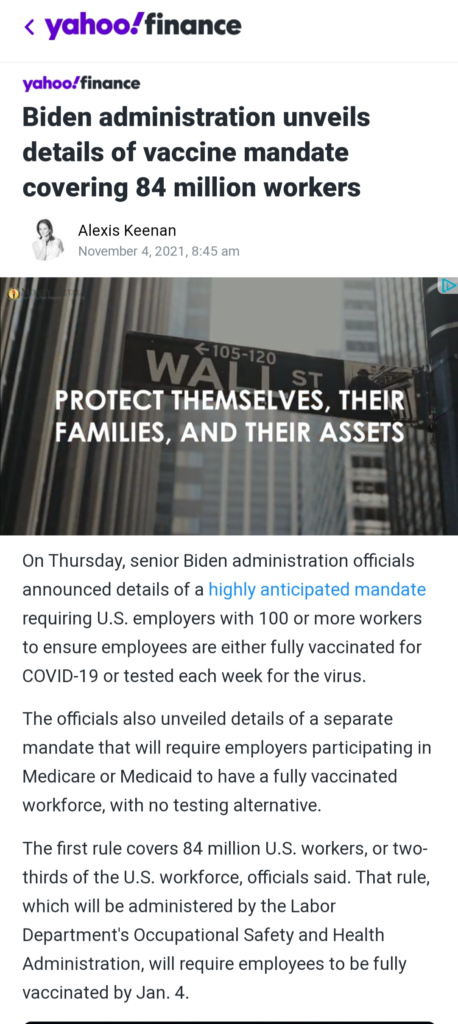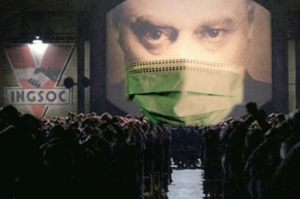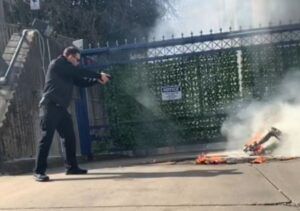CDC Changes Definition of Vaccine to Combat “Right-Wing COVID Deniers,” OSHA Finally Creates an Emergency Temporary Rule to Mandate Vaccines, Vaccine Effectiveness Wanes in 2-3 Months, Durham Investigation Arrest, and How to Resist (Legally and Peacefully)

Zero Hedge obtained emails from the CDC via the Freedom of Information Act that demonstrate the CDC changed the definition of the vaccine because “COVID deniers” pointed out on the internet that COVID-19 mRNA vaccines did not meet the CDC’s definition of vaccine:
OSHA Creates Vaccine Mandate via Emergency Temporary Rule
OSHA has finally created an Emergency Temporary rule to mandate all employers with at least 100 employees mandate the COVID-19 vaccine. The OSHA rule is over 480 pages and is available via the Federal Register.

Also from Yahoo:
President Joe Biden’s upcoming mandate that most U.S. workers either get vaccinated against COVID-19 or get tested weekly will most certainly face legal pushback. But labor and employment lawyers say those challenging the standard could have a tough time winning their cases.
“Inevitably, there will be ready plaintiffs to challenge this,” Rutgers University employment law professor Stacy Hawkins said about Biden’s announcement Thursday directing the U.S. Department of Labor’s Occupational Safety and Health Administration (OSHA) to adopt the new regulations for private sector U.S. employers with more than 100 workers.
The new, yet-to-be-seen rule, called an emergency temporary standard, would apply to approximately 100 million U.S. workers and about two-thirds of U.S. employees, according to the White House. Federal employers and contractors would be required to get vaccinated, with no testing option alternative.
Still, challenges are not insurmountable. As noted by the law firm Beveridge & Diamond, prior to OSHA’s emergency temporary standard for health care workers issued in June, the agency had promulgated emergency rules nine times, and among them, five were stayed, or vacated in part, under court challenges. According to the Congressional Research Service, prior to the June rule, OSHA had last attempted to use the rule-making authority in 1983.
From the Daily Mail:
Businesses face a $14,000 fine if they do not co
Workplaces who are found noncompliant with the rule could face up to a $13,653 fine for each unvaccinated employee, the same standard for other violations.
Repeat offenders or those found to be willfully noncompliant could face a maximum fine of $136,532. It is not immediately clear what constitutes a repeat offender.
EEOC and Vaccine Mandates
L. Vaccinations – Title VII and Religious Objections to COVID-19 Vaccine Mandates
The EEOC enforces Title VII of the Civil Rights Act of 1964 (Title VII), which prohibits employment discrimination based on religion. This includes a right for job applicants and employees to request an exception, called a religious or reasonable accommodation, from an employer requirement that conflicts with their sincerely held religious beliefs, practices, or observances. If an employer shows that it cannot reasonably accommodate an employee’s religious beliefs, practices, or observances without undue hardship on its operations, the employer is not required to grant the accommodation. See generally Section 12: Religious Discrimination; EEOC Guidelines on Discrimination Because of Religion. Although other laws, such as the Religious Freedom Restoration Act (RFRA), may also protect religious freedom in some circumstances, this technical assistance only describes employment rights and obligations under Title VII.
L.1. Do employees who have a religious objection to receiving a COVID-19 vaccination need to tell their employer? If so, is there specific language that must be used under Title VII? (10/28/21)
Employees must tell their employer if they are requesting an exception to a COVID-19 vaccination requirement because of a conflict between that requirement and their sincerely held religious beliefs, practices, or observances (hereafter called “religious beliefs”). Under Title VII, this is called a request for a “religious accommodation” or a “reasonable accommodation.”
When making the request, employees do not need to use any “magic words,” such as “religious accommodation” or “Title VII.” However, they need to notify the employer that there is a conflict between their sincerely held religious beliefs and the employer’s COVID-19 vaccination requirement.
The same principles apply if employees have a religious conflict with getting a particular vaccine and wish to wait until an alternative version or specific brand of COVID-19 vaccine is available.
As a best practice, an employer should provide employees and applicants with information about whom to contact, and the procedures (if any) to use, to request a religious accommodation.
As an example, here is how EEOC designed its own form for its own workplace. Although the EEOC’s internal forms typically are not made public, it is included here given the extraordinary circumstances facing employers and employees due to the COVID-19 pandemic. (Note: Persons not employed by the EEOC should not submit this form to the EEOC to request a religious accommodation.)
L.2. Does an employer have to accept an employee’s assertion of a religious objection to a COVID-19 vaccination at face value? May the employer ask for additional information? (10/25/21)
Generally, under Title VII, an employer should assume that a request for religious accommodation is based on sincerely held religious beliefs. However, if an employer has an objective basis for questioning either the religious nature or the sincerity of a particular belief, the employer would be justified in making a limited factual inquiry and seeking additional supporting information. An employee who fails to cooperate with an employer’s reasonable request for verification of the sincerity or religious nature of a professed belief risks losing any subsequent claim that the employer improperly denied an accommodation. See generally Section 12-IV.A.2: Religious Discrimination.
The definition of “religion” under Title VII protects nontraditional religious beliefs that may be unfamiliar to employers. While the employer should not assume that a request is invalid simply because it is based on unfamiliar religious beliefs, employees may be asked to explain the religious nature of their belief and should not assume that the employer already knows or understands it. By contrast, Title VII does not protect social, political, or economic views, or personal preferences. Section 12-I.A.1: Religious Discrimination (definition of religion). Thus, objections to COVID-19 vaccination that are based on social, political, or personal preferences, or on nonreligious concerns about the possible effects of the vaccine, do not qualify as “religious beliefs” under Title VII.
The sincerity of an employee’s stated religious beliefs also is not usually in dispute. The employee’s sincerity in holding a religious belief is “largely a matter of individual credibility.” Section 12-I.A.2: Religious Discrimination (credibility and sincerity). Factors that – either alone or in combination – might undermine an employee’s credibility include: whether the employee has acted in a manner inconsistent with the professed belief (although employees need not be scrupulous in their observance); whether the accommodation sought is a particularly desirable benefit that is likely to be sought for nonreligious reasons; whether the timing of the request renders it suspect (e.g., it follows an earlier request by the employee for the same benefit for secular reasons); and whether the employer otherwise has reason to believe the accommodation is not sought for religious reasons.
The employer may ask for an explanation of how the employee’s religious belief conflicts with the employer’s COVID-19 vaccination requirement. Although prior inconsistent conduct is relevant to the question of sincerity, an individual’s beliefs – or degree of adherence – may change over time and, therefore, an employee’s newly adopted or inconsistently observed practices may nevertheless be sincerely held. An employer should not assume that an employee is insincere simply because some of the employee’s practices deviate from the commonly followed tenets of the employee’s religion, or because the employee adheres to some common practices but not others. No one factor or consideration is determinative, and employers should evaluate religious objections on an individual basis.
When an employee’s objection to a COVID-19 vaccination requirement is not religious in nature, or is not sincerely held, Title VII does not require the employer to provide an exception to the vaccination requirement as a religious accommodation.
L.3. How does an employer show that it would be an “undue hardship” to accommodate an employee’s request for religious accommodation? (10/25/21)
Under Title VII, an employer should thoroughly consider all possible reasonable accommodations, including telework and reassignment. For suggestions about types of reasonable accommodations for unvaccinated employees, see K.6, above. In many circumstances, it may be possible to accommodate those seeking reasonable accommodations for their religious beliefs, practices, or observances without imposing an undue hardship.
If an employer demonstrates that it is unable to reasonably accommodate an employee’s religious belief without an “undue hardship” on its operations, then Title VII does not require the employer to provide the accommodation. 42 U.S.C. § 2000e(j). The Supreme Court has held that requiring an employer to bear more than a “de minimis,” or a minimal, cost to accommodate an employee’s religious belief is an undue hardship. Costs to be considered include not only direct monetary costs but also the burden on the conduct of the employer’s business – including, in this instance, the risk of the spread of COVID-19 to other employees or to the public.
Courts have found Title VII undue hardship where, for example, the religious accommodation would impair workplace safety, diminish efficiency in other jobs, or cause coworkers to carry the accommodated employee’s share of potentially hazardous or burdensome work. For a more detailed discussion, see Section 12-IV.B: Religious Discrimination (discussing undue hardship).
An employer will need to assess undue hardship by considering the particular facts of each situation and will need to demonstrate how much cost or disruption the employee’s proposed accommodation would involve. An employer cannot rely on speculative hardships when faced with an employee’s religious objection but, rather, should rely on objective information. Certain common and relevant considerations during the COVID-19 pandemic include, for example, whether the employee requesting a religious accommodation to a COVID-19 vaccination requirement works outdoors or indoors, works in a solitary or group work setting, or has close contact with other employees or members of the public (especially medically vulnerable individuals). Another relevant consideration is the number of employees who are seeking a similar accommodation (i.e., the cumulative cost or burden on the employer).
L.4. If an employer grants some employees a religious accommodation from a COVID-19 vaccination requirement because of sincerely held religious beliefs, does it have to grant the requests of all employees who seek an accommodation because of sincerely held religious beliefs? (10/25/21)
No. The determination of whether a particular proposed accommodation imposes an undue hardship on the conduct of the employer’s business depends on its specific factual context. When an employer is assessing whether exempting an employee from getting a vaccination would impair workplace safety, it may consider, for example, the type of workplace, the nature of the employee’s duties, the number of employees who are fully vaccinated, how many employees and nonemployees physically enter the workplace, and the number of employees who will in fact need a particular accommodation. A mere assumption that many more employees might seek a religious accommodation to the vaccination requirement in the future is not evidence of undue hardship, but the employer may take into account the cumulative cost or burden of granting accommodations to other employees.
Also from the EEOC:
Quebec dropped COVID-19 vaccine mandates for healthcare workers, stating that the loss of “unvaccinated staff would have had a ‘devastating effect on the system.'”
Below is an excellent discussion of how to fight vaccine mandates and other anti-liberal, pro-totalitarian measures (from The Corbett Report):
Vaccine Effectivenes Wanes after 2-3 Months (via Lancet Journal Article)
A researcher has exposed significant data issues with the Pfizer vaccine trial, which are detailed in the peer-reviewed BMJ:
The Atlantic outlined serious problems with the public health response to COVID-19:
What is clear, however, is that case numbers, the metric that has guided much of our pandemic thinking and still underlies CDC’s indoor-masking recommendation for vaccinated people, are becoming less and less useful. Even when we reach endemicity—when nearly everyone has baseline immunity from either infection or vaccination—the U.S. could be facing tens of millions of infections from the coronavirus every year, thanks to waning immunity and viral evolution. (For context, the flu, which is also endemic, sickens roughly 10 to 40 million Americans a year.) But with vaccines available, not every case of COVID-19 is created equal. Breakthrough cases are largely mild; 10,000 of them will cause only a fraction of the hospitalizations and deaths of 10,000 COVID cases in the unvaccinated. The more highly vaccinated a community is, the less tethered case numbers are to the reality of the virus’s impact.
To prevent hospitals from being overwhelmed, the key group we need to vaccinate is really the elderly. The risk of hospitalization for an unvaccinated person over 80 is 25 times that for an unvaccinated person under 18. A Financial Times analysis of data from the U.K. found vaccinating 25,000 children had the same effect on hospitalizations as vaccinating just 800 adults over age 60. Unvaccinated elderly adults are just that much more likely to become severely ill with COVID-19. You can’t compensate for a low vaccination rate among older adults by vaccinating more people in younger groups, says Müge Çevik, a virologist at the University of St. Andrews.
Vaccine effectiveness has plummeted from 95% to 0%:
And in other news, “Igor Danchenko, a Russia analyst who worked with Christopher Steele, the author of a dossier of rumors and unproven assertions about Donald J. Trump, was taken into custody as part of the Durham investigation.”:







